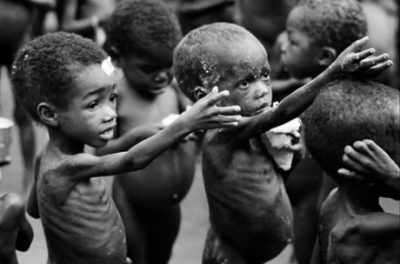Injustice Is the Most Important Cause of Humanitarian Crisis including Famine, So Why Is It Rarely Mentioned?

All Global Research articles can be read in 51 languages by activating the Translate Website button below the author’s name (only available in desktop version).
To receive Global Research’s Daily Newsletter (selected articles), click here.
Click the share button above to email/forward this article to your friends and colleagues. Follow us on Instagram and Twitter and subscribe to our Telegram Channel. Feel free to repost and share widely Global Research articles.
Global Research Wants to Hear From You!
***
Humanitarian crises deserve the most urgent attention. While rushing all possible help and mobilizing adequate resources must be the most immediate priority, ultimately the aim must be to minimize the possibilities of humanitarian crisis erupting time and again in various parts of the world. For this it is important to identify the right causes and to strive to remove or reduce these as much as possible.
If we look at most recent documents on humanitarian and extreme hunger situations in the world, these generally mention these factors the most—conflicts, climate change, adverse weather, disasters, disease outbreak etc. Generally various forms of injustice-historic and present—are not mentioned, even though these may well be the most important root cause, and those responsible for these injustices are not identified.
The maximum number of humanitarian crisis situations have been reported in recent years from the continent of Africa. However there were times when communities of African people were able to meet their food and other basic needs in much more secure and sustainable ways, with safe storages existing for bad weather years. Over vast areas communities of small farmers and pastoral people had learnt to exist in harmony, with nomadic pastorals taking herds of cattle, goats and other animals to seasonal pastures, making the best and most sustainable use of existing resource constraints, preventing existing natural resource base from coming under too much pressure.
Image: Reproduction of a handbill advertising a slave auction in Charleston, British Province of South Carolina, in 1769 (From the Public Domain)

This changed with the advent of colonial plunder and loot. Its worst manifestation was the slave trade.
The Atlantic slave trade lasted for 400 years, taking away 15 million Africans to the Americas under conditions so terrible that about 40% of the captives died on route and huge numbers died within a few years of reaching the destination. Another large number of able-bodied African men were forcibly taken away by colonial predators, or their local collaborators, to operate their mines and plantations, depriving sustainable farming of manpower, increasing the burden on women. To make way for colonial projects, there was land grab and the traditional routes followed by pastorals were disrupted.
At the same time, as more taxes were imposed, small farmer communities came under increasing pressure to grow cash crops for sale in place of staple foods, further endangering food security. To pay taxes the pastorals had to go on increasing herd size beyond sustainability needs, further increasing pressure on land and natural resources.
Colonial wars and land grabs led to the arbitrary drawing up of new land boundaries which further disrupted pastoral routes. Communities which had existed in harmony with each other were drawn into conflicts as the existing sustenance systems broke down, while hostilities on narrow ethnic and other grounds were also instigated by colonial rulers and predators.
As more countries tried to gain freedom, in some countries colonial violence was stepped up greatly, coming on top of world war battles. This brought in more destructive weapons and people trained in using them. As more countries started gaining freedom, former colonial masters hastened to ensure that elites friendly to their interests remained in power. In the Democratic Republic of Congo, for instance, the immensely popular leader Patrice Lumumba committed to a path of justice and equality was assassinated by a joint conspiracy of Belgium and the USA (probably Britain as well), paving the way for the rule of dictator Mobutu’s long, disastrous regime of plunder and oppression.
As such dictators and other elites allowed the richest countries to plunder their country’s resources while importing luxuries for their use, their countries became heavily indebted, leading to stringent conditions being imposed which further impoverished the poor. At times they had to continue exporting cash crops while people at home died of hunger due to lack of staple foods. When this was widely condemned, new western aided plan for increasing food production emerged which too were linked to promotion of agribusiness interests and the expensive, dependence increasing technology promoted by them led to more indebtedness of farmers.
Policies of supporting dictators and collaborating elites who would perpetuate neo-colonialism were by now means confined to African countries. Several elites notorious for their cruel exploitation of their own people became much more powerful due to support from big powers. In Latin America when one such dictator was being supported by the USA and there was criticism of this by someone who called the dictator the “son of a bi…” the response of a US leader was— “he may be the son of a bi.. but he is our son of a bi…”
In fact the USA and other big powers even provided military help to some of these dictators and elites and even proxy wars were started by big powers promoting rival sides. A clever dictator like Mobutu could manage to get the support of both the USA and China.
In the middle of all this, it is the common people, particularly the small famers and pastoral communities who suffered the most and their resilience was harmed the most when it needed to be strengthened to cope with climate change.
It is the many sided injustices suffered by people which are responsible the most for the humanitarian crises being suffered by so many countries but when this is not even acknowledged in many reviews of these crisis situations, how can we expect that strategies based on resisting and reducing such injustices can evolve? This is a basic problem of the existing humanitarian crisis response which must be corrected.
*
Note to readers: Please click the share button above. Follow us on Instagram and Twitter and subscribe to our Telegram Channel. Feel free to repost and share widely Global Research articles.
Bharat Dogra is Honorary Convener, Campaign to Save Earth Now. His recent books include Protecting Earth for Children, Planet in Peril, Man over Machine and A Day in 2071. He is a regular contributor to Global Research.
Featured image source

